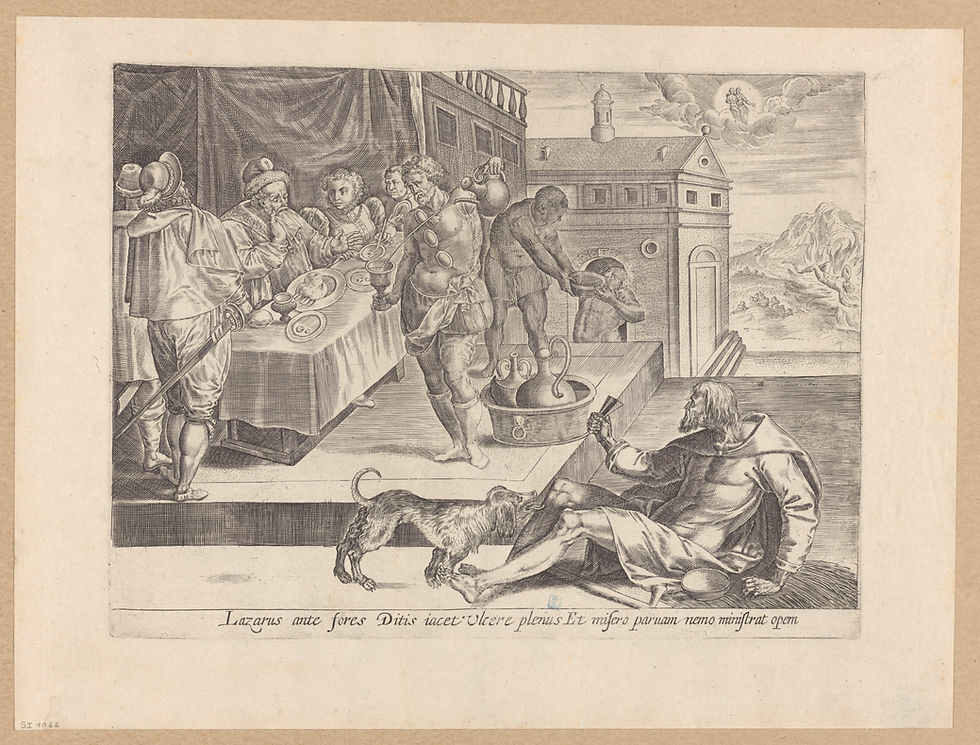Sunday Homily, 28 September 2025 - Fr Paul Rowse, OP
- paulrowse
- Sep 28, 2025
- 4 min read
The rich man didn’t go to Hades because Lazarus suffered; he went to Hades because he knew Lazarus and his suffering, but did nothing about it. And we who know about the suffering of others must help them, if there’s to be a future for us in God. Hopefully, we’ve all taken that straight-forward message to heart. We know that we’ll be without excuse on the last day, if we’ve ignored our neighbour’s plight. Our sentence will read: “Deemed to have known.” So, act now, help the poor, and all will be well.
That’s not the full message the Pharisees received when they first heard this parable. There’s a little more to the story for them. This parable is told, not to the crowds or to the disciples, but to the Pharisees. And the fuller meaning of the parable which came instantly to them we can live by as well.
We begin by noting that this is the only one of the Lord’s parables with named protagonists: Abraham and a Lazarus. The names have even more significance for the Pharisees than for us. We know that the Pharisees claimed physical and moral descent from Abraham. That descent was to make them heirs to God’s promises of peace, prosperity, and progeny. As ancestors go, Abraham is close; in a moral sense he’s just one generation away: he is father Abraham. And it is to his faithfulness that the Pharisees aspire.
Lazarus is an intriguing name for a character in this kind of parable. Not only is Lazarus the name of Abraham’s servant in Genesis; it’s also the name of one of the Pharisees’ heroes of old. This Lazarus was a real person, who went to the home of one of the leading Jews of his day. And at table, this Lazarus told his host that he was the son of unwed parents. Thus, Lazarus stands for truth telling, upholding morality, and to such a degree that he makes people outcasts from within their own homes.
For all the reversals that follow, the parable begins with a reversal. The Pharisees don’t have the hero status they’re used to. So, as the story unfolds, the Pharisees are conflicted. The Pharisees should be with Abraham, upholders of moral standards like their hero, Lazarus. They should be with Abraham because they have kept themselves apart from irreligious people, whether Jews or non-Jews. What is more, their man Lazarus isn’t the hero of the story: he didn’t receive Abraham’s promises in this life. The hero of the story is the one who came to Lazarus’ aid: the hero is God, Lazarus’ help. In the words of our Psalm: “It is the Lord who keeps faith for ever, who is just to those who are oppressed” (Psalm 145:6-7).
When the Pharisees first heard this parable, Lazarus stands for all those people who would be great sons and daughters of Abraham if only someone would bring them in and show them how. They need to break bread with them and feed their souls, tend their wounds and strengthen their hearts. Looking closely, no one keeps faith with God like Abraham does. Even the most observant Pharisee needs other Pharisees to keep them going. So, it won’t do, the Lord is saying, to keep apart from the unfaithful: they need to be brought in from the cold, fed and clothed, healed and so helped.
As we hear this parable anew, we know that Lazarus is not only seen in the materially poor, but also in the morally and spiritually poor. They’re well known to you. They might be around the dinner table before long. They could be great Christians if only someone would show them how. None of us keeps the faith perfectly. So, we show the way in humility and in a spirit of service. True love for our family and friends means holding out the flame of faith for them, keeping the torch of hope lit, that they aren’t too far gone for us to help them. Like those whom the Pharisees cast out, they need guides towards holiness. They need you. So, I have three simple gestures which might help to restart important conversations in any stagnant process.

Firstly, consider giving them personal testimony. Don’t tell them what Christ teaches, not yet. Instead, try sharing with them what Christ means to you, how much he means to your daily life, how lost you’d be without him. That they see how he is your brother and friend, Saviour and king might be enough for them to explore what’s possible for them too.
Secondly, invite them to Mass. They don’t need to sign up to everything on the first day; that will come in time we hope. Just invite them to take the first step. Will you come and pray with me today at Mass? Maybe introduce them to a friend here, or encourage them to light a candle for a loved one. Don’t underestimate the power of an immersive experience with us.
Thirdly, give them a small gift. It’s hard to ignore kindness, and even harder to ignore generosity. The gift you give should be something tangible, a symbol that they can hold in their hand. Next month is the month of the Rosary. I’ll gladly bless the dozens of Rosary beads you bring for your family, friends, and neighbours.
The indifference to the plight of others must cease, and all the kinds of poverty we find need to be addressed. You’re the best person to help your neighbour because you know a little about them. You’re near them; you see them. Now help to bring them in. Bring them home to God and you too may join him in being the hero of the Lord’s story.
Fr Paul Rowse, OP Parish Priest


